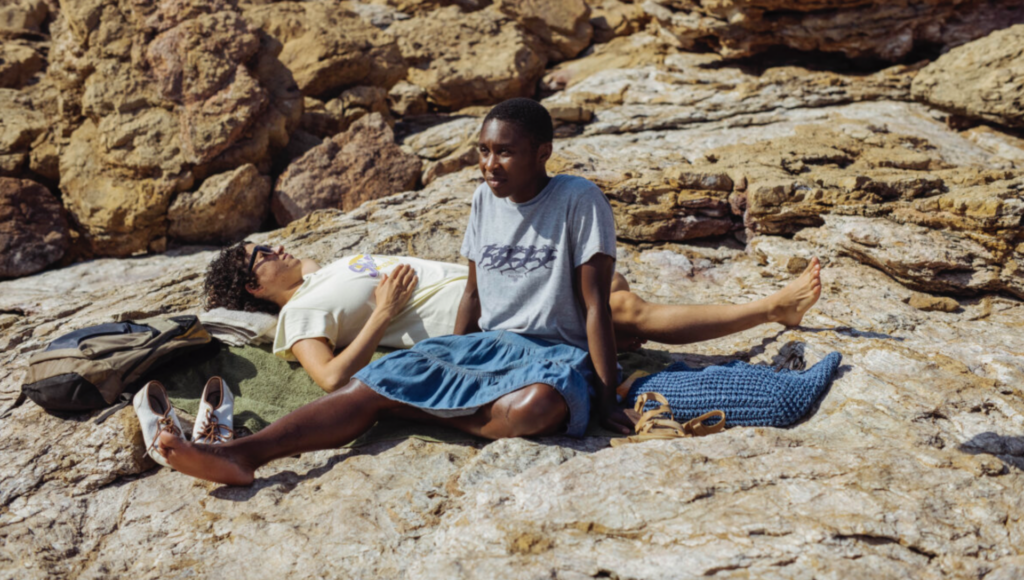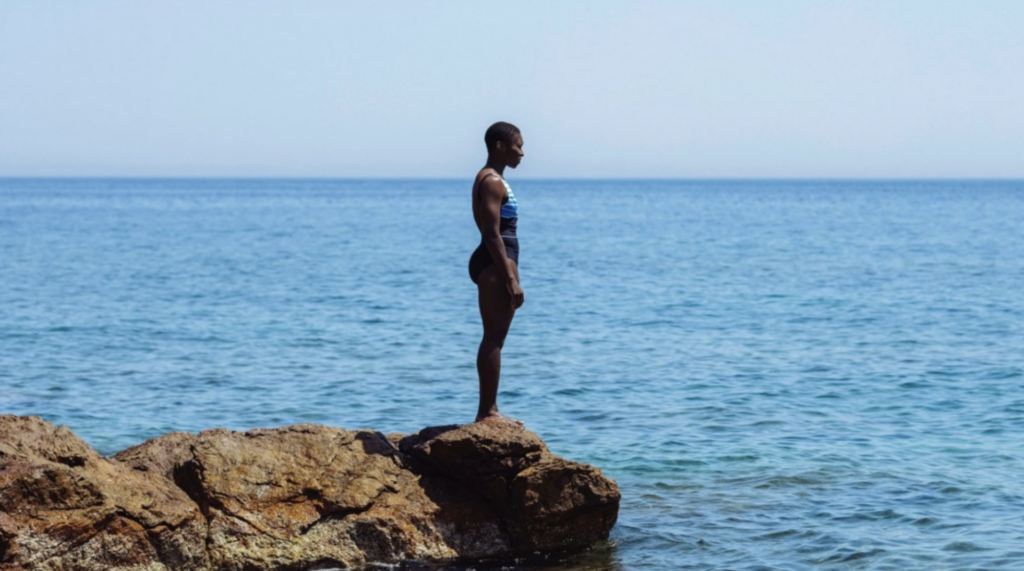Cynthia Erivo on the ‘incidental’ queerness in her new movie Drift: ‘I felt really proud of that’
Excl: "I find myself outside of myself going, what the heck's going on?" says the Wicked star as she reflects on the surreality of seeing Sally Field at the Oscars and feeling "proud" of her LGBTQ identity

Cynthia Erivo’s film breakthrough came in 2018, in the underseen but astonishing Bad Times at the El Royale. Since then, the powerhouse singer and stage veteran has received two Oscar nods – in 2019, for Best Actress and Best Song, for Harriet Tubman biopic Harriet – and landed a starring role with Ariana Grande in the upcoming Wicked films.
The force of her silver screen ascension makes us need to lie down. What a lovely addition, then, is the lower key Drift. This stripped-back drama follows Liberian refugee Jacqueline, who’s rebuilding her life on a Greek island after escaping the trauma of war. Directed by Anthony Chen and co-produced by Erivo, it was a labour of love. “This film was made on a wing and a prayer, honestly,” Cynthia tells Attitude over Zoom. “It didn’t have a lot of money. We didn’t have a lot of time to make it. We really had to pull together and work hard.”

Here, the star reveals all about the two-month shoot, having a “front row seat” to her mother’s immigrant experience, and the sweet reason she was “blown away” seeing Sally Field at the 2024 Oscars. We’d have been the same!
What’s the Drift elevator pitch?
Drift is about a woman, Jacqueline, who we meet after the Liberian war, who was displaced in Greece. She’s trying to put the fragments of her life together and meets another person on the path to doing the same. The connection they make seems to be an indelible one.
As an Oscar-nominee and with your profile, what is your response to the perception that it’s easy to get a film like this off the ground?
It’s not easy to get any film off the ground, at all. It’s not easy to convince people to give you money for it. It’s not easy to get the film filmed. Sometimes it might fall together, depending on who you are. But nine times out of 10, it takes a lot of work.
Can you give examples of ways you produced the film?
At the beginning, we really didn’t have any money. We needed funding. I had to go to many different lists of friends who could possibly help. So, it’s like, gathering the money. I managed to find one of my mentors was able to put forward some money. I would help with the costuming, figuring out who would work for casting. Once we found Alia [Shawkat, who plays Cynthia’s on-screen love interest], I would get on interviews with her, have conversations. There was one scene on the beach; we had two other scenes to shoot in daylight. In Greece, your shoot day is no more than 12 hours. I’m in the middle of the scene, knowing we have to move on. My brain’s going: ‘We can only do one more take … I’m not short-changing myself.’ You’re doing both those things at the same time.
That’s illuminating. Here I was assuming it must have been refreshing working in a different way to the bigger productions. Actually, it sounds stressful.
Yeah, it is. I think that’s because there’s more to do and less hands to do it, on a smaller production. You’ve more at stake. It can be very, very stressful.
Props to you for the performance, so much of which is unspoken, and with body language. How do you do that?
You just take the circumstance you’re in and dig into it. There’s no formula. I believe enough that I’m that character, so the natural thing is to do that. The work is done before you get to the set. What’s her body language? What’s the language she uses? It’s those details you paint before. For me, it’s every little thing, right down to the t-shirt and skirt she’s wearing. And the sandals. I could run, but not that fast.
Speaking of intentional versus incidental, I liked how the character’s queerness was incidental, not the main focus. Forgive me for having not read the source novel, but can you tell me, is the character in the novel queer?
I haven’t read the source novel, but I read this piece, and that is what I saw, that felt right. That’s what I love about it: it was incidental. It’s just part of who she is. And it’s not up for discussion or debate. It is what it is. I felt really proud of that.
Your character jumps back in the closet briefly, saying she has a husband. As an actor, can that be triggering? Does it bring up unwanted memories?
It doesn’t – it’s not triggering to me, because I’m very proud of who I am. And I don’t think, for her, it’s necessarily because she’s not proud of who she is. I think it’s the want to blend in, you know? So, I think, because it comes from something other than ‘I’m not proud of who I am’ and more to do with ‘I don’t want this person to know anything about me’… It feels like it’s from something else. [… But] everything is up for interpretation. That’s the point of these things. If that moment triggers the horrible thought of having to go backwards on yourself, I don’t think that’s an invalid feeling.
How did the years-long process of making the film inform your view on the immigrant experience? Did your view change in that time?
No, because I happen to be a proud daughter of a of an immigrant. She came from Nigeria, she was around during the Biafran War and had to go through it; suffered, ran from her home, all those things. Then came to London in her 20s, and really had to survive, make it on her own. So, I have a deep understanding of what it is to have to start again, build your life from scratch, because that’s what my mum did. And honestly, when I was little, I was still watching my mum do that. It took a long time for her to get to a place where she felt stable and safe. Now, she’s as happy as can be. But it took time. And I sort of had a front row seat to it. And for the time that I wasn’t there, I’ve had conversations, she’s spoken to me about it. I’ve a deep empathy for people who have come through that. I think those who don’t necessarily understand, or have never been through it, or seen anyone go through it, can’t comprehend what it must feel like, to have to leave somewhere you know well and begin again. To build something better for yourself. Or to know where you are is not going to provide the thing that you need to live the life you want. Those who have deep empathy, who haven’t experienced it, are wonderful people. Those who have empathy, who have experienced it – they have experience. And those who don’t have empathy, who haven’t experienced, simply can’t fathom it.
What would you say to your character if she were real?
I’d ask what she’s looking for, what she’s searching for from her future that keeps her going. Because something keeps her going.
Does she stay with you?
Yeah. I have loads of questions for her actually. As simple as: ‘Are you okay? What do you need?’
Have you reflected on where she is now?
I’ve never really done that before, but I have with her. In my head, I think she’s got a little shop and home of her own somewhere. Nothing fancy, but comfortable. I don’t think she’s in Greece. Happy – finding happiness.
What’s your message to viewers moved by the story who want to help people in your character’s position, but don’t know where to start?
There are loads of organisations that help specifically refugees who are displaced. Research companies, find the one that speaks the most to you, then donate whatever you can. Over Christmas, loads of people end up displaced. Go and give them Christmas dinner. Go meet people, talk, be human.
Was Jacqueline being a journalist something she plucked out of thin air, or was there backstory?
I think because of her English schooling and where she comes from, the life she lived with a father in politics, where journalists would be consistent – it’s a world she knows and understands. I think that that’s probably why she plucked it out.

When actors play journalists, I think: what would you ask yourself, if in my shoes?
I’d ask: ‘Is it surreal to be you in your position now? Does it feel real?’
Does it?
It’s really odd sometimes! I find myself outside of myself going, what the heck is going on? How did that happen? I think, sometimes, we fall into patterns of thinking that some of this stuff is normal. It’s not. Being at the Oscars is not a normal thing. That’s not something everybody experiences. I’m constantly trying to remind myself of the fact that that these are not everyday things. That forces me to sit in a space of gratefulness. And to never let it get old. I don’t want the kid in me to be like, bored! I want the kid in me to be like: ‘This is really cool.’ I want to be blown away when I see Sally Field!
Drift is out in UK cinemas from Friday 29 March
